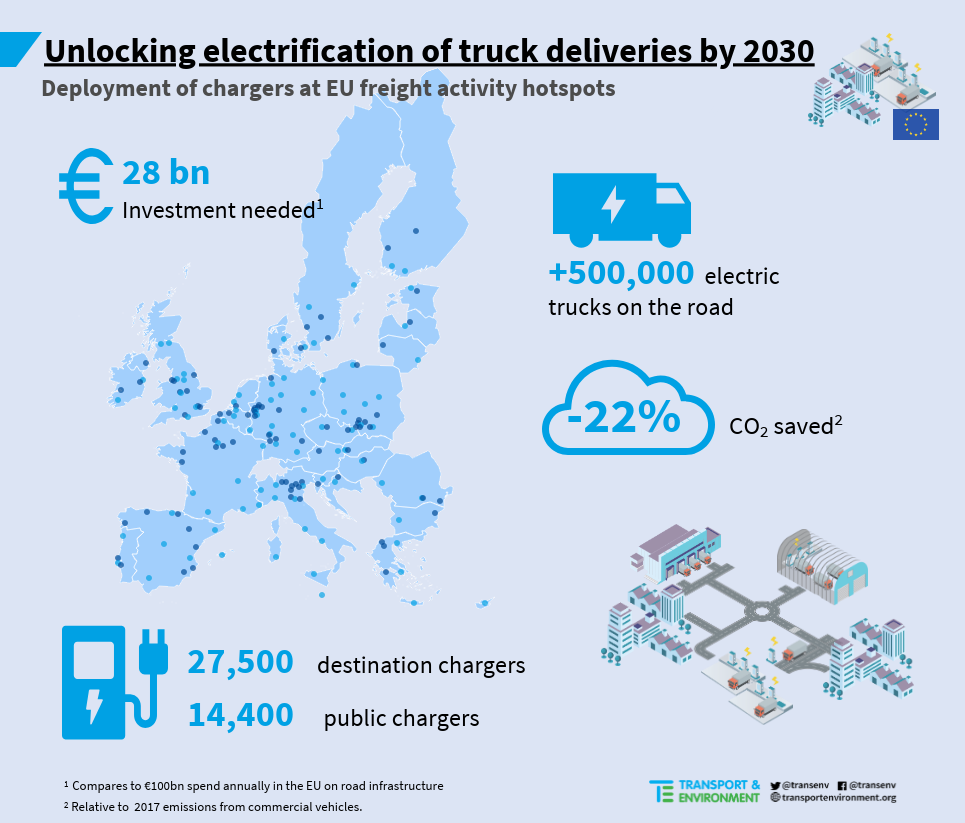
Interested in this kind of news?
Receive them directly in your inbox. Delivered once a week.
By analysing truck flows data, the report identifies 173 cities and urban areas where chargers are needed within a decade to put Europe’s road freight on a path to zero emissions.
The 40,000 chargers at distribution centres and public places would require a €28 billion investment over 10 years, the analysis finds. Currently €100 billion is spent on road infrastructure every year in the EU.
T&E’s transport and e-mobility analyst, Lucien Mathieu, said: ‘Electric trucks are clean, cheaper to run and available today. But the lack of a European charging strategy and the underwhelming supply from European truckmakers is holding back the market. The EU needs to set ambitious targets for the roll-out of infrastructure and let Europe’s truck fleet go emissions free.’
Providing these chargers will serve half a million e-trucks and allow 43% of the EU’s truck trips to go emissions free by 2030, the analysis shows. Cities and towns would benefit from clean and quiet vehicles making home deliveries and supplying supermarkets.
Next year’s review of the Alternative Fuels Infrastructure Directive (AFID) is an opportunity for the EU to move from theory to practice and set targets for electricity and green hydrogen infrastructure, T&E said. Infrastructure to fuel gas trucks, which can be up to five times worse for air pollution than diesel, offers no path to decarbonisation and should therefore be excluded. In 2022, the EU should also push truckmakers to accelerate the supply of zero-emission vehicles with more ambitious CO2 reduction targets when it reviews the 2030 standard.
At the same time, the EU is currently developing new standards for safe and secure truck parking areas. While the main aim is to ensure there are safe and good resting conditions for European truck drivers, the legislation could also plan ahead for the future deployment of electric charging and hydrogen refuelling stations for zero-emission trucks. In an open letter, a rare alliance of truckmakers, suppliers, NGOs and the power sector said the Commission should also use the opportunity to require charging and refueling infrastructure along motorways,
The letter – signed by T&E, the auto manufacturing lobby ACEA, retailer Meyer & Meyer, Wind Europe and others – calls for a requirement to install charging stations for refrigerated trucks in all upgraded or new parking areas. This could save 69% of CO2 emissions, 93% of NOx pollution and 96% of PM emissions per net operating hour of these vehicles.
The European Commission is drafting the delegated act over the summer and representatives of member states within an expert group are expected to vote on the proposal in September.
The EU is receiving strong encouragement from businesses to accelerate the transition to clean trucks. Last week 18 leading businesses and organisations launched the European Clean Trucking Alliance (ECTA) to call for the decarbonisation of road freight in the EU in order to meet the emission targets of the proposed EU Climate Law by 2030.
In 2019, the EU set targets for reducing CO2 emissions from new lorries for 2025 and 2030 for the first time in the EU. The alliance is urging the Commission to now take further steps and “come forward with a clear pathway and political strategy to enable the deployment of zero-emission vehicles and infrastructure”.
ECTA’s members include major hauliers, logistics and consumer goods companies such as Deutsche Post DHL Group, AB InBev, Inter IKEA group, Meyer & Meyer, Nestlé and Unilever. T&E is also a member.
The Commission’s first vice-president and climate chief Frans Timmermans welcomed the alliance. ‘I’m pleased to see yet again an impressive group of businesses, NGOs, and citizens from across Europe coming together in support of this goal,’ he said.
‘The European Clean Trucking Alliance offers European capitals a concrete project to include in their economic recovery plans: decarbonising truck fleets. With the European Green Deal as its compass, the Alliance can accelerate the move towards zero-emission freight transport for a healthier future and a stronger economy.’


